Devon Trevarrow Flaherty's Blog, page 2
May 2, 2025
ARC Review: A Family Matter
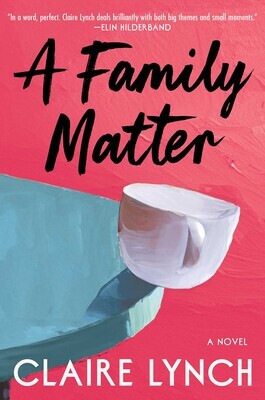
A Family Matter by Claire Lynch will be published in June in both England and America. (There is a giveaway on GoodReads, if you want to enter.) I expect it to be well-received. It is a beautiful, poignant, and pacific book with strong currents of pain, injustice, and joy beneath that carefully considered surface of Hemingway-esque prose. I look forward to Lynch’s future work and hope that she keeps her voice exactly the way it is. As for this book, the familiarity is almost startling, and yet the sympathy is a step removed. The style is almost poetry, but the most readable kind of poetry. It’s easy to slip into this book and you might even read it in a day.
Dawn is a young mother of a toddler in a quiet, cookie-cutter marriage in 1984 Windsor, England. When Hazel drops into her life, she can’t deny the excitement and attraction from the first meeting. In 2022, Heron has just received news that he has cancer, but the one thing he doesn’t want to do is tell his daughter, the one who visits almost daily. He also doesn’t want to tell her the other secrets he’s been keeping from her.
This is a short book at 219 pages of easily-readable, easily-comprehended text with lots of white space. Lynch’s style is brief, sparse, but extremely effective. She doesn’t need 300 or 400 pages to weave together the lives and times of four main characters. In fact, the beginning is a little slow and the end a little abrupt, but otherwise I would say the pacing is perfect. It reminded me of The Great Believers (Rebecca Makkai) or even Small Great Things (Jodi Picoult). For the record, Lynch’s writing is better and Makkai just takes longer to say things. (I loved Great Believers but not so much Small Great Things.) In all three, I was taken to a point in history where a minority was being systematically oppressed, and I learned so much while reading fiction. More importantly, I became incensed because I cared about these people. And since all three take place within my lifetime, it hurt a little to know it. (Great Believers is about the AIDS crisis in Chicago in the 80s, Small Great Things about neo-Natzi violence coupled with the believability of a Black woman in a professional setting, and A Family Matter is about lesbian motherhood/rights as parents over the past several decades).
But A Family Matter isn’t about things at all, in that sense. Even though Lynch came from a memoir and essays (this is her debut novel), this is very much a character-driven novel. It’s about these four people whose heads we dip effortlessly in and out of. We care about them (as Clare Chambers says on the cover, “…there were no heroes of villains…”) long before we even know what it is we’re dealing with here. Except a parent dealing with illness. That we know about right away.
It’s a calm, straight-forward read. I did see some of the twists coming, but for others I was on the edge of my seat. As I said before, though, it takes some time to get some traction. I wasn’t sure if I wanted to continue but let me assure you it gets more engaging as you go. By the meat of the middle, you will be engaged. There is a reviewer on GoodReads who said, “You feel like you’re floating among the characters’ lives. Or rewatching memories through a pensieve (ala Harry Potter)” (Megan). While bringing Harry Potter into this seems like a bad idea (it just has no similarities in any other way), I think the pensieve is a really great way to explain the feeling the reader has in this book. Like they are a witness, but not in the book. A ghost “floating” through, not immersed. It is Lynch’s writing style, and it’s probably what makes the brevity possible as well as what really makes this book special, makes her voice sparkle in its sparseness.
When I looked Lynch up and saw that she went to Oxford and is an English professor, it tracked so hard. Everything about this book is so precise, so intentional. And then when I saw that she had a memoir about motherhood and that she has a wife and three daughters, the rawness of the topics and simplicity of the prose clicked into place. Ah. Aha. It’s kind of like she’s saying things at a whisper, but the things she’s saying have so much emotion pushing behind them.
On consideration, I liked this book more than I thought I liked this book. It did start out slow. And I am not entirely happy with the ending. (It was abrupt? Too simple? Not far enough?) But I would definitely recommend it for summer reading, for any reading. It is short and goes down smooth. You will find lots of quotes (which unfortunately I can’t share with you because I have an ARC) and learn a lot. Unless you are heartless or extremely stubborn, you will sympathize, maybe empathize. (Oh, the horror! I believe in empathy, emphatically. This is a comment of the moment, but it’s 2025 and empathy is a bad word in some subcultures.) It is sorta literary fiction, sorta women’s fiction, and would be great for book clubs. Lynch is schooling us in how to write deeply and beautifully without getting all long-winded or purple prose. The blub on the cover says it best: “[It] is a heartbreaking and hopeful exploration of love and loss, intimacy and injustice, custody and care, and whether it is possible to heal from wounds of the past in the changed world of today.”
Note: I really appreciated the Author’s Note at the end, putting some of this fictional story into historical context.
Final note: If it’s not too late (it almost certainly is), the cup on the back cover is visually very confusing due to the light coming from the bottom, etc. I tested it out on a few people, and no one could figure out what they were looking at until I turned the book around and pointed.
May 1, 2025
Poetry Book Review: Modern Poetry

And no, we are not referring to the Norton Anthology of Modern Poetry, although, actually, I love those giant anthologies that Norton has made for decades. And Diane Seuss references the Anthology in her latest book of collected poems, Modern Poetry. This is a collection that ruminates on modern poetry as one of its main themes. This book has strong themes, a strong sense of place, and a strong and consistent voice. It is also the volume published hot on the heels of Seuss’s Pulitzer-winning frank: sonnets.
(Credit to my So and So Books book club for the discussion which led to plenty of these thoughts.)
At 109 pages, Modern Poetry is more than a chapbook. This is Seuss’s sixth book of poetry since 1998. She has also been published poem-by-poem is places such as The Best American Poetry, The New Yorker, The Paris Review and The Yale Review. And she has won awards, including the Pulitzer, the National Book Critics Circle Award, the PEN, and a Guggenheim fellowship. So we know she can write. Her books are:
It Blows You HollowWolf Lake, White Gown Blown OpenFour-Legged GirlStill Life with Two Dead Peacocks and a Girlfrank: sonnetand now Modern PoetryThe poetry here is basically approachable, as long as you are in the “head space” to read poetry. If you don’t catch every reference or every five-dollar word, you just keep reading and you still understand some and feel a lot. It is also a bit dreary, but a sparse and beautiful kind of dreary. Ditto with gritty. Suess is conversational and direct, and extremely self-aware, more even than how aware we are of her in the poems. She addresses herself repeatedly and deals with themes including hurt creating gods, where we come from mattering, living in the present, the opposite of Capitalism (like a sort of depressed, Bohemian, rural Midwestern thing), and, most obviously, modern versus romantic poetry. Meta poetry. She repeatedly mentions: Keats, menstruation, pain, poetry, death/dying/funerals, Rimbaud, the impossibility of love, a long line of lovers, and animals (all of which appear in an abased, skeletal beauty).
So the main theme (just look at the title and the titles of the poems) is modern vs. romantic poetry. It would help before reading this to familiarize yourself with the basic concepts and history of each. Sure, they have historical time periods, but more importantly, romantic poetry is emotional and populist, while modern poetry is more cultural and political, elitist, and academic. Please don’t just take my word for it. Look it up. Seuss likes to see herself as a romantic poet. I think.
A few other things. If you are from Michigan, you’ll find a lot of Easter eggs in the work. If you are rural and/or Midwestern, you will relate to the poems, especially if you are of a certain age. I don’t see Seuss’s self-flagellation as false modesty. I saw it as honesty. And a certain kind of life that has been precisely gnawed upon, maybe we’ll call it rough living. Also, there are so many musical terms. Are these terms that are used in poetry critique, too? Or is there something I’m missing here?
My favorite poems in this collection are:
“Juke”“Comma” (which is great for reading aloud)“Folk Song”“Threnody”“Coda”“Romantic Poet”Followed by:
“My Education”“Pop Song”“An Aria”“Weeds”“Cowpunk”“Bobby”“The Personal”“The Other”I enjoyed reading this book of poetry. It is clearly skillful and thoughtful; meanings and rabbit trails are tucked in just about every corner. I appreciated the breaking of the fourth wall, and even the Grey Gardens vibes, the Grimm’s fairy tales meets trailer in the woods. Seuss is a mythologizer. She speaks to us with reality in one hand and fantasy in the other. The ground feels unsteady, but the vertigo doesn’t quite throw us to the ground. In other words, the dreariness and grit weren’t too much for me. I enjoyed Suess’s frankness, her smearing of everything in her world together. It was, actually, strangely beautiful.
Further reading recommendations:
Kay RyanJames Wright and Franz WrightWild Geese, Mary Oliverthe Norton antologiesfrank: sonnets and/or Still Life with Two Dead Peacocks and a GirlSylvia Plath reading aloud “Daddy”
I hope no one (read Seuss or her publisher) is too mad at me for how many quotes I included here. It’s nowhere near like a ten per cent (including of any one poem), but there were so many great quotes.
“You can’t hide / from what you made / inside what you made // or so I’m told.” (p6, “Curl”)
“You can’t stay vigilant and remain alive, / Or infinite vigilance is a kind of death, / Or you can’t be present tense. / That is, tense about the present.” (p10, “Little Song”)
“…Dickinson …. A horse straining at the bit / in the direction of free verse. A woman who drove / a motorcycle to Women’s Literature, wore a fringed / black leather jacket…” (p13, “Modern Poetry”)
“My project / was my life.” (p17, “My Education”)
“To a dead man, / a living adult daughter must be such an overwhelm, a real load, / and from death he had learned to prefer simplicity, the ephemera / of steam rising from a cup, birds, but he didn’t care what kind / of birds. He was wearing a humble but clean shirt. He wanted, / I believe, to keep it that way. I was like a cake / with too many ingredients that had overflowed its pan, spilled // into the oven, and smoldered there.” (p21, “Pop Song”)
“Are the gods mocking me for acting / in-the-know? This would happen back home a lot. / Anybody who tooted their own horn / or dared to sound as if they were an expert // on any subject were mocked and driven / into the next county. Never hold yourself above. / There is no expertise. There is only good sense, / earned hard and held close to the vest.” (p29, “Villanelle”)
“You know what? I want to be rich and lithe.” (p31, “Folk Song”)
“It matters how and where you are made, / and what // materials were at hand for the makers.” (pp33-34, “Folk Song”)
“The best poem is no poem.” (p38, “Coda”)
“A free show is never really free.” (p42, “An Aria”)
“My mind has grown wooden around love, // like a tree that has nearly swallowed / a garden / gate where lovers met at moonrise / when the air was thick with Hesperis.” (p42, “An Aria”)
“May I take the murdered world in? / Sing of it again?” (p44, “An Aria”)
“In their literature / they wrote of winter as their season of suffering. / There are worse things than winter, I wanted to say, / handing them money for bread” (p47, “Allegory”).
“But meaning, in a gale, is the first to go.” (p48, “Allegory”)
“There is a poetry of rage and a poetry of hope. / Each fuels the other, looks in the mirror and sees / the other. Or wields the other.” (p48, “Allegory”)
“Dictionaries then were musty and heavy and old. / You had to go to them. They did not come to you.” (p49, “Allegory”)
“You understand / that you can cross a hundred bridges, / but there is no way to go north again, / by which I mean it’s time to put to bed, / like the row of the giant’s children / in their matching nightcaps / our allegories of innocence.” (p51, “Allegory”)
“When I nursed my baby decades / back, moonlight poured in the window, / and starlight, / and I felt myself click into the template, / like a bone back into its joint, / doing what mothers do and have done. / Maybe I was painted on an urn somewhere.” (p64, “Simile”)
“…beauty… it is not something to work on / but a by-product, at times, / of the process of our making.” (p71, “Poetry”)
“Either way / please don’t tell me flowers / are beautiful and blood clots / are ugly. These things I know, / or I know this is how / flowers and blood clots / are assessed by those content / with stale orthodoxies. / Maybe there is such a thing / as the beauty of drawing near. / Near, nearer, all the way / to the bedside of the dying / world. To sit in witness, / without platitudes, no matter / the distortions of the death throes…” (p72, “Poetry”)
“I have oppositional / poetry disorder.” (p77, “Rhapsody”)
“I want to express / my opinion about people expressing their opinions.” (p77, “Rhapsody”)
“For love, for love. / What ridiculous things I’ve done, / I’ve said big dick when I meant small dick.” (p79, “Little Fugue with Jean Seberg and Tupperwear”)
“Women back then had to have cold // hearts.” (p82, “The Personal”)
“I miss the days when I had / a grandmother and no one personalized / anything I did.” (p82, “The Personal”)
“If I had an insight, / I’d keep it bottled up / until it disappeared, and I didn’t / have that many insights. Imagine / it. One pair of red shoes and no // slippers.” (p83, “The Personal”)
“Her house had always been a respite. / When she got sick it became the scene of the crime.” (p85, “The Other”)
“Maybe deep, deep down beneath / the hipness and provocations, he was a true believer.” (p87, “The Other”)
“Whatever grace you stumble upon, / don’t sit on it like a smug hen on its eggs. / Whatever you think of yourself, / think otherwise, Diane.” (p87, “The Other”)
“Maybe the body is the soul’s / metaphor.” (p95, “Against Poetry”)
“Maybe to escape [the body] / is to escape the service / economy. To dissolve analogy. / Attain uselessness.” (p95, “Against Poetry”)
“…and poems, / skinned free of poets, / like the favorite shoes of that dead / girl now wander the streets / with someone else’s feet in them.” (p99, “Legacy”)
“…stars as the poor see them, / who cannot afford glasses.” (p103, “High Romance”)
April 29, 2025
Books That Caught My Eye, Spring 2025
Working in a bookshop has taken my book-noticing to a new level. I already “noticed” books all the time when I was in bookstores, when I was listening to podcasts, when I was attending book events or looking through magazines and fliers… Believe it or not, it has intensified. So, I thought that now and again I would want to vent all this noticing into a blog. I won’t burden you with every book I notice. (Some go into my TBR and other lists.) But I will give you some interesting titles to notice with me.
Let’s begin with random books I notice around the shop. I have been surprised that many of my favorite books to flip through while on the job are cookbooks (okay, not surprising at all) and humor. Never would I have thought the levity section had so much to interest me. This list has everything from levity to children’s board books to poetry to puzzles. Just whatever.
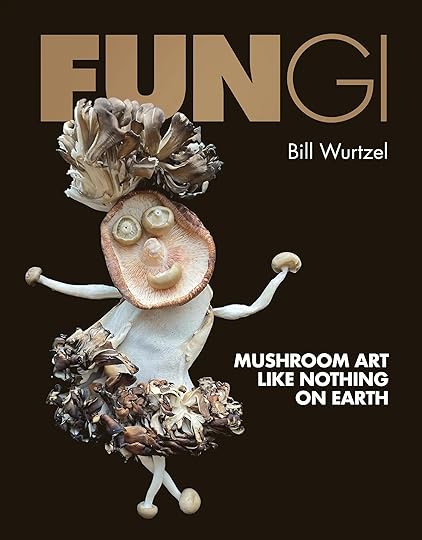



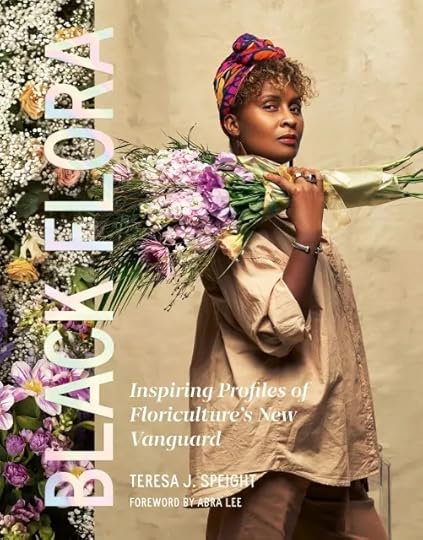
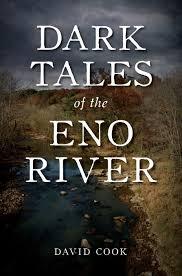
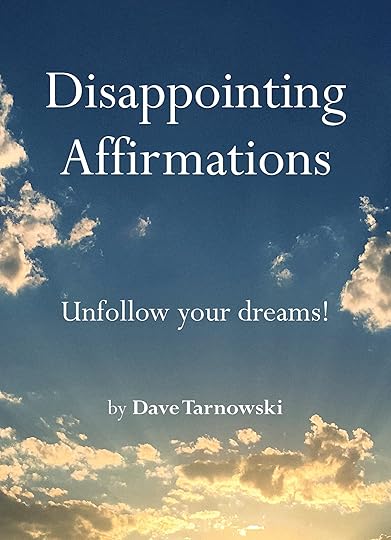
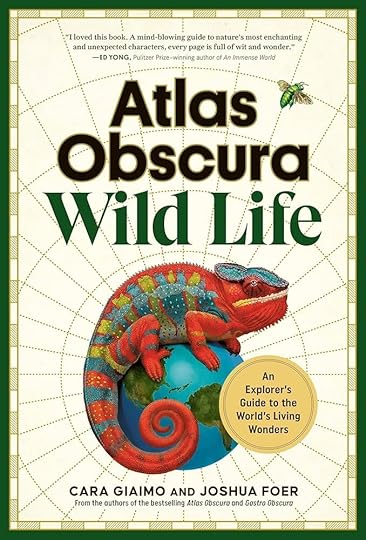
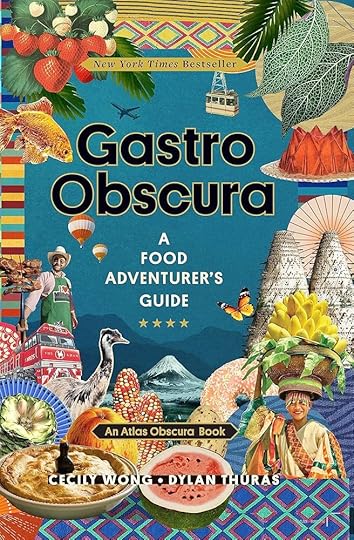
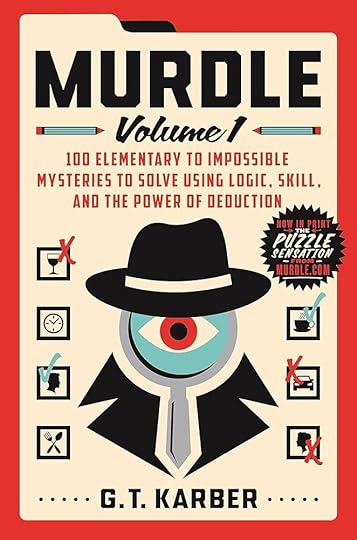
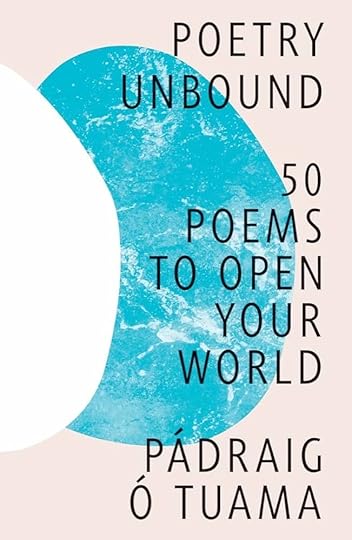
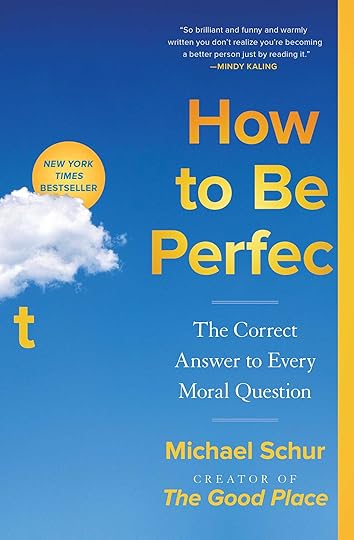

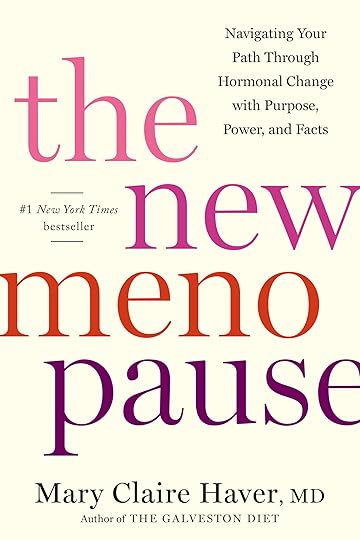
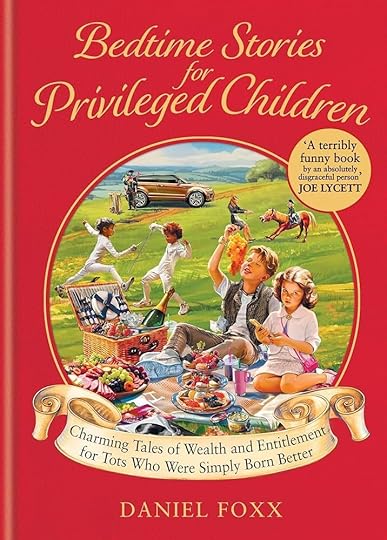

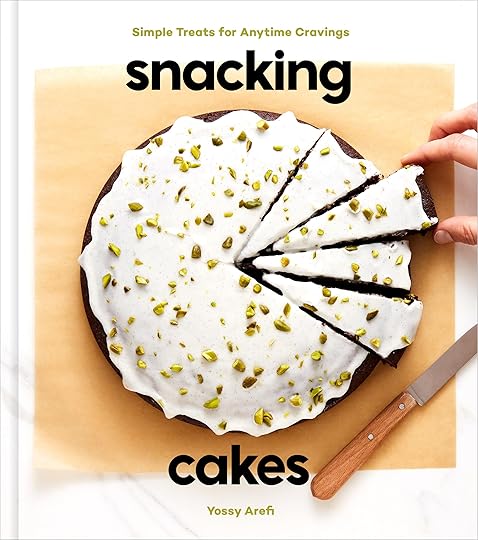


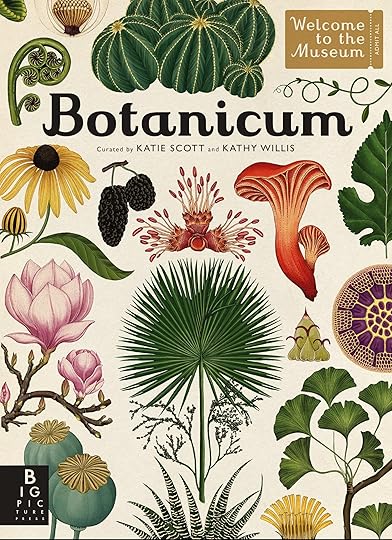
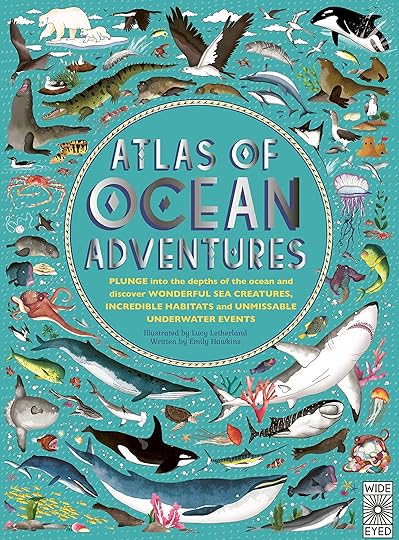
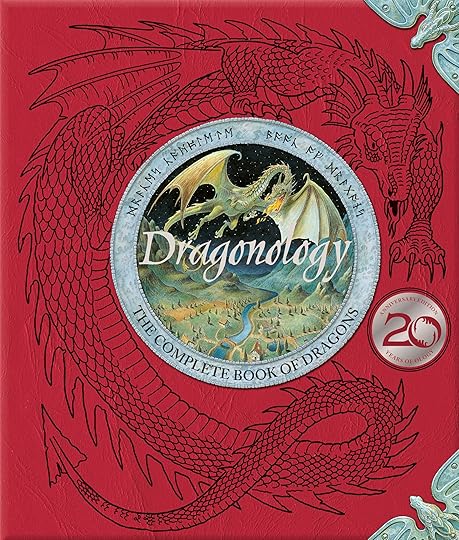 Fungi, Bill WurtzelA Dumb Birds Guide to the Worst Birds Ever, Matt KrachtHug Machine, Scott CampbellThank you Please Come Again, Kate MedleyBlack Flora, Teresa J. SpeightDark Tales of the Eno River, David CookDisappointing Affirmations, Dave TarnowskiAtlas Obscura Wildlife, Giaimo and FoerGastro Obscura, Wong and ThurasMurdle, G. T. KarberPoetry Unbound, Padraig O TuamaHow to Be Perfect, Michael SchurWorld Travel, Anthony BourdainThe New Menopause, Mary Claire Haver MDBedtime Stories for Privileged Children, Daniel FoxxDragon’s First Taco, Adam RubinSnacking Cakes, Yossy ArefiSnacking Bakes, Yossy ArefiThe Beautiful Poetry of Donald Trump, Sears and SearsWelcome to the Museum Books, like Botanicum, Kathy WillisEmily Hawkins books, like Atlas of Ocean Adventures and Atlas of Animal AdventuresDragonology, Dugald Steer
Fungi, Bill WurtzelA Dumb Birds Guide to the Worst Birds Ever, Matt KrachtHug Machine, Scott CampbellThank you Please Come Again, Kate MedleyBlack Flora, Teresa J. SpeightDark Tales of the Eno River, David CookDisappointing Affirmations, Dave TarnowskiAtlas Obscura Wildlife, Giaimo and FoerGastro Obscura, Wong and ThurasMurdle, G. T. KarberPoetry Unbound, Padraig O TuamaHow to Be Perfect, Michael SchurWorld Travel, Anthony BourdainThe New Menopause, Mary Claire Haver MDBedtime Stories for Privileged Children, Daniel FoxxDragon’s First Taco, Adam RubinSnacking Cakes, Yossy ArefiSnacking Bakes, Yossy ArefiThe Beautiful Poetry of Donald Trump, Sears and SearsWelcome to the Museum Books, like Botanicum, Kathy WillisEmily Hawkins books, like Atlas of Ocean Adventures and Atlas of Animal AdventuresDragonology, Dugald SteerNow I’ll give you a few of our recent best-sellers. These titles have flown off the shelves, lately, some more recently than others.
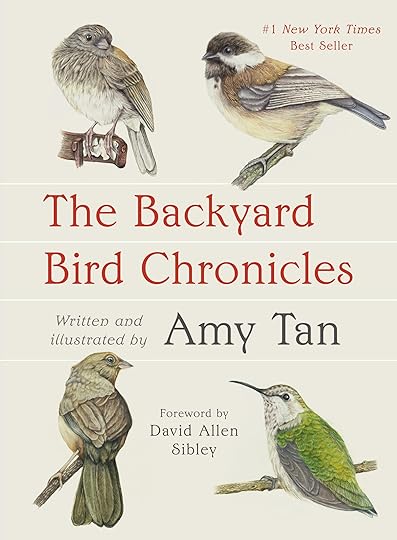
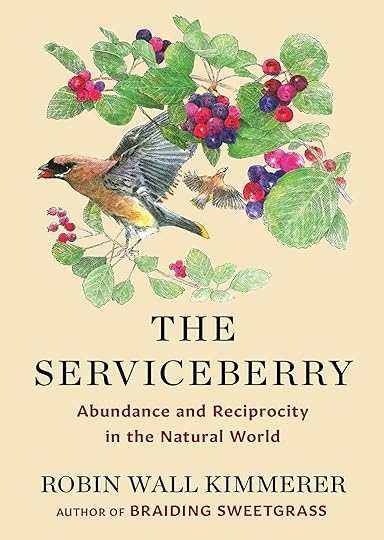

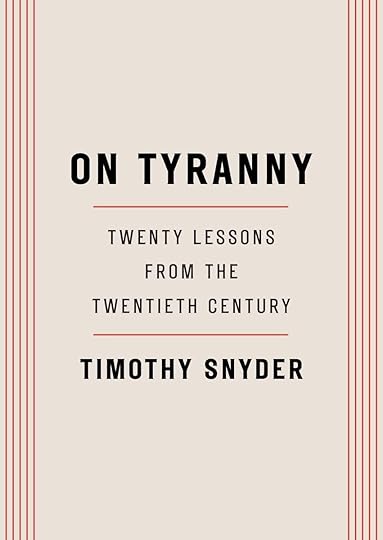

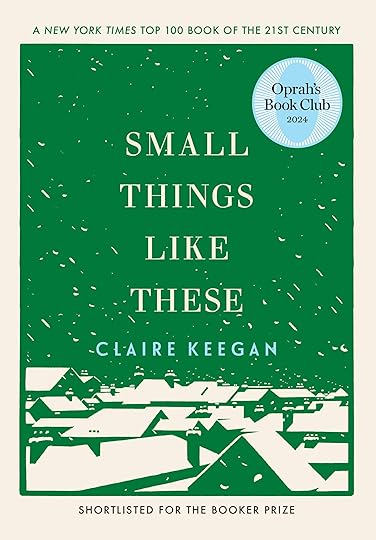
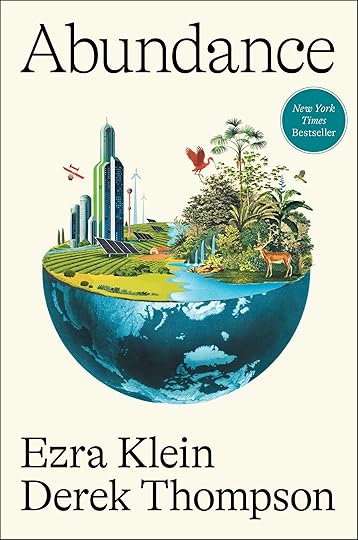

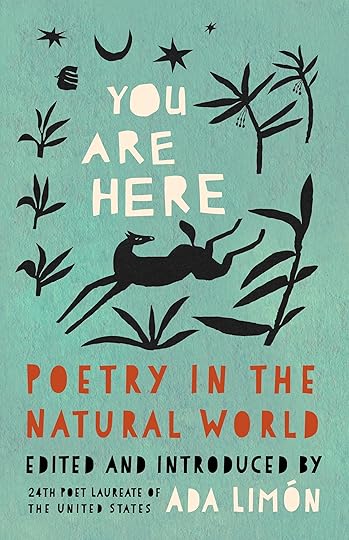
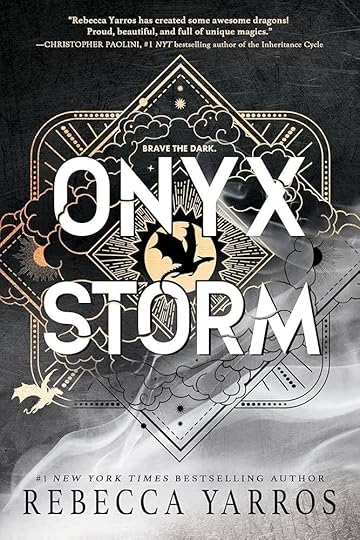
 The Backyard Bird Chronicles, Amy TanThe Serviceberry, Robin Wall KimmererA Philosophy of Walking, Frederic GrosOn Tyranny, Timothy SnyderFoster and Small Things Like These, Claire KeeganAbundance, Ezra KleinEverything Is Tuberculosis, John GreenYou Are Here, Ada Limon(and also Onyx Storm and Great Big Beautiful Life, of course)
The Backyard Bird Chronicles, Amy TanThe Serviceberry, Robin Wall KimmererA Philosophy of Walking, Frederic GrosOn Tyranny, Timothy SnyderFoster and Small Things Like These, Claire KeeganAbundance, Ezra KleinEverything Is Tuberculosis, John GreenYou Are Here, Ada Limon(and also Onyx Storm and Great Big Beautiful Life, of course)(We might also want to note Ursula K. Le Guin, Octavia E. Butler, James Baldwin, Mary Oliver, James, and Claire Lispector.)
That’s all. These are some of the books on my mind and on in the Durham public’s hands. I’ll save up titles to vent next time. Maybe next season.
April 28, 2025
Series Review: Love’s Academic
I have not had this much fun reading a book(s) in a long time. And it’s not like I haven’t had some fun reading some books lately, it’s just that the Love’s Academic series by India Holton is the most fun. Victorian England, fantasy, science, romance, and Indiana Jones, but over-the-top on all counts. I thought I might enjoy it, but I loved it. I won’t be able to read her other stuff fast enough.


I picked up the second book in the series, The Geographer’s Map to Romance, as an ARC of sorts. Sometimes ARCs (advanced reader copies) are really just brand-new copies sent to bookshops and book influencers, not actually in advance or different from the book everyone else is getting on the shelves, you know, for promotional reasons. I picked it up a little in advance, but just got to reading it, well, yesterday. It was published on April 8th, a couple weeks ago. Which means you can run out and buy the first two books right away! Since I had been given a copy of the second book, I went ahead and purchased a copy of the first book and read that first. Then devoured them both.
Those books are The Ornithologist’s Field Guide to Love and The Geographer’s Map to Romance. The projected next book in the series is The Antiquarian’s Object of Desire. I have not seen a projected date for that, but I’d say give it at least a year. In the meantime, I am going to pick up Holton’s other series, Dangerous Damsels.
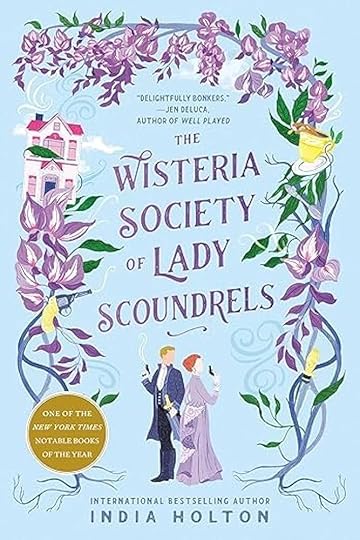
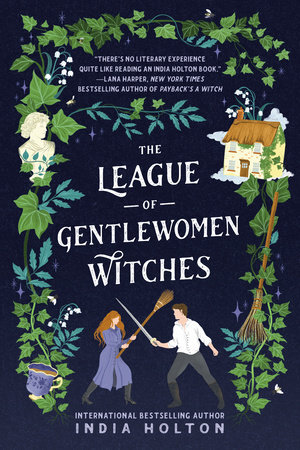
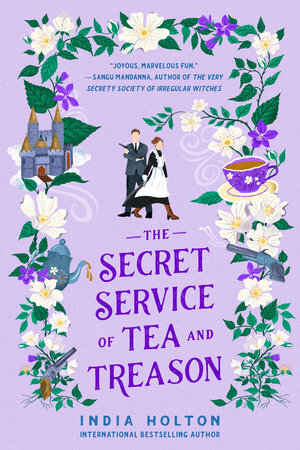
The thing is, you can read any book from the Love’s Academic series in any order you want. They are episodic, and even though there are connections from one book to the next with background characters and even references to previous plot points, there is no need to know them. They’re more just for fun. And each story has a different heroine and hero, though so far, the tone and the voice are very consistent. Both books are a wild romp with witty moments, pervasive humor, literary references galore, steamy romance, Victorian British muddles, word-play, feminist fun, light steam punk, magic mixed with science, coziest cozy, entertaining side characters, and seriously over-the-top conventions to the point that we’re satirizing them. No, maybe it’s farce. Or just reveling in tropes. All of it. Like I said, the most fun. Or like Jen Deluca says on the cover of The Wisteria Society of Lady Scoundrels, “delightfully bonkers.”
I started with book one, The Ornithologist’s Field Guide to Love. It is (surprise!) about two thaumaturgic ornithologists/professors dealing with magical birds. There is a competition for Birder of the Year which will come with ***tenure!*** and Beth Pickering wants that prize. But not only has it turned all the other already-ruthless birders into enemies, the rather attractive and villainous Devon Lockley has joined in the chase. Proper and roguish are natural enemies, aren’t they?
Yes, we know where this is going. Genre fiction isn’t meant to surprise us in that way. We know what kind of ending is coming. We know that there will be delaying and longing and moments of sizzle along the way. But, believe me, you are still going to come across surprise after surprise, delight after delight, in the plot but mostly in the writing style. I did find some mistakes here and there (mostly typos), but I trust Holton. She means to do exactly what she is doing. She could write literary fiction if she wanted (that’s my take), but she has given herself to our entertainment and secreting book-lovers tidbits and adventure-fantasy nuggets in between writing that is far better than adequate (which is my threshold for a genre book). You might now and again think she’s gone too far, that she’s off the rails with her writing or just in imagination, or that it’s too cutesy to use strikethrough font, but you’d be wrong. She’s gone and done (and said) exactly what she meant to. She’s given her talents to not only genre and cross-genre but also to our good times while also hiding a million little edifications of a sort (or skillful lunges with the literary rapier), and she has excelled.
I’m probably talking it up too much. And surely there are people who just won’t enjoy this style, what she’s trying to accomplish here. But I am so on board. I am in the fan club and first in line! I am unapologetic.
And then I got to the ARC, The Geographer’s Map to Love. And I loved it even more than the first one! For several little reasons, I found it to be constructed better. But I was thrown back into this wild world of my dreams. Whereas Ornithologist was very Indiana Jones-ish, Geographer was constantly referencing literature, including Shakespeare and Jane Austen. It would be hard to narrow down the influences in these books, really, but the mish-mash is a perfectly overlapped Venn Diagram with my dream world. I loved Indiana Jones as a kid (and still kinda do), Shakespeare, Jane Austen, and all the other crazy things thrown into the mix.
One thing: reading both books that close together was probably not the best idea. They are pretty darn similar, being comedies-of-errors, opposites-attract stories between young, savant science professors in the same fantastical world. With two braided perspectives, leaning more heavily on the female. With fake-quote witticisms opening each chapter. Even the same catch phrases, including “gosh” and “Aaaaaggghh!” Therefore, a little space would have taken away the “Did I just read this?” feeling. However, I didn’t stop. I couldn’t if you offered me tenure.
Elodie Tarrant married Gabriel Tarrant at a moment’s notice as a marriage of convenience. But the Doctors Tarrants’ avoidance of each other a year later is anything but convenient. When a thaumaturgic geological disaster looms over a small town in Wales, nobody is sure just which Doctor Tarrant is being called for and so they both board the crazy train for the Welsh countryside. Gabriel is arrogant and stoic (which can actually read as autistic in a different time and culture) and Elodie is the freest of free spirits (which can read as ADHD in a different time and culture). Which means that they can’t possibly fit together, right?
Goodness. I was laughing out loud and underlining poignant life lessons throughout. I happened to have an actual day off yesterday and since I had enjoyed Ornithologist so much, I picked up Geographer. I finished it before bedtime. Sure, if I had had things to do that were pressing on me, I would have had to set the book down and take a couple days, but I probably would have missed much sleep because I couldn’t put it down.
You get it. I love this series. I will be reading more of the series when it drops and also more Holton. I know some people won’t click with it, but many will. Just relax a little and let Holton take you on the wild historical-adventure-fantasy-romance ride that is the Love’s Academic series.

The Ornithologist’s Field Guide to Love
“A wise woman allows nothing to ruffle her feathers; she is the ruffler of feathers” (p42).
“The adventuring woman should not just expect the unexpected, bu be the unexpected” (p258).
“’Good grief,’ she muttered. ‘Why do people have to people?’” (p269).
“And anyone who says cruel things, or uses silence as a weapon, is a bully who knows how to be violent without lifting a finger” (p283).
The Geographer’s Map to Romance
“Elodie didn’t mind, feeling that tedium was best described as an opportunity for imagination” (p4).
“If you want things to flow easily, you have to give a dam” (p17).
“Manners are for people who don’t have anything more interesting to say” (p21).
“Longitude tells you your relative position, much the same as longing does” (p89).
“Time doesn’t only go forward, it foes deep too” (p125).
“Sometimes place is a feeling” (p159).
“Pull yourself together, Elodie Hughes, she grumbled, or her mother did (sometimes it was hard to tell the difference between those two inner voices)” (p165).
“What we see of a tree is its own underneath. Dirt is its sky, and light its dreaming” (p221).
“…the tetchiness she knew so well, and that’s she’d even come to love, recognizing it to be not a meanness in his character but a vulnerability showing where he was rubbed sore by a world too loud, bright, and rough-edged for him” (p244).
“…she appeared to be efficiency personified, a trait all too often equated with ‘terrorizing’ in women” (p282).
“Oh God, this was why she shouldn’t be left unsupervised with a conversation!” (p305).
“You’re already where you want to go. Getting there is part of being there” (p308).

There doesn’t seem to be anything in the making from Holton’s books. But honestly, while I think the Love’s Academic series books so far would make amazing movies, I also don’t think they could be quite what the books are—they would have to lose some of their dimension since the word-play and literary allusions, etc., are a large part of the art.
Gift Ideas for Retirement and Birth
…assuming that the retiree is a book nerd. Most of the people around me these days are. And if you walk into the bookshop where I work, I am going to assume your friend or family member is a book nerd of the sort we usually get at the shop (unless you tell me otherwise, of course).
For retirement, bags filled with small gifts seems to be de la rigueur. So get a bag (maybe even a reusable one with their name or a bookish saying on it, for the library and their shopping. I came across a bag the other day that actually said, and I quote, “I want a burrito to tuck me gently into its warm beans and say ‘Rest here, my child. Be at peace now.’” Of course, “Goodbye tension, hello pension” works too. Then fill it up. Classically, you could begin with:
clothing items (tees, hats) with more witty retirement sayings on them, especially socks with the saying printed on the bottom (because their feet will now be up)mugs with the same witty sayings, and make sure they are keep-at-home mugs. Travel mugs need not apply.bookmarks, or in my case, post-it notes with literary characters on thempens, especially fun or over-the-top or silly pens (or highlighters)small field note journals for throwing in a purse or sliding into a pocket and jotting down birds, yes, and also book ideas or book listsetc.And now for the books that you will put in their bag:
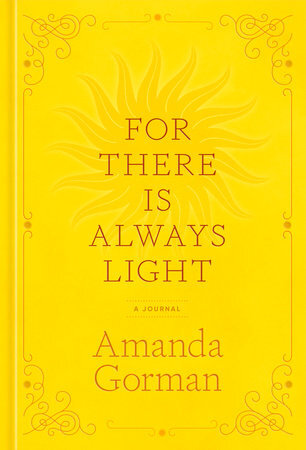


 For There Is Always Light, Amanda Gorman, which is actually a journal with the occasional quote from Gorman’s poetryA Philosophy of Walking, Frederic GrosFoster, Claire KeeganYou Are Here: Poetry in the Natural World, Ada LimonAnd possibly, if you have room in the bag for something bigger: The Backyard Bird Chronicles, Amy Tan (or A Dumb Birds Field Guide to the Worst Birds Ever, Mat Kracht, if that’s their sense of humor)
For There Is Always Light, Amanda Gorman, which is actually a journal with the occasional quote from Gorman’s poetryA Philosophy of Walking, Frederic GrosFoster, Claire KeeganYou Are Here: Poetry in the Natural World, Ada LimonAnd possibly, if you have room in the bag for something bigger: The Backyard Bird Chronicles, Amy Tan (or A Dumb Birds Field Guide to the Worst Birds Ever, Mat Kracht, if that’s their sense of humor)
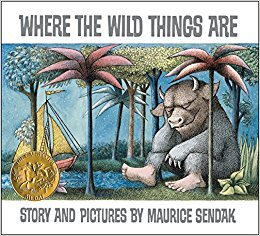
As for a baby shower, you will also begin with a bag. If the parent(s) know their new baby’s name for sure, then that goes on the bag followed by “’s Books.” This is for their trips to the library, mostly, so it could also say “Sally’s Library Books.” You probably want to purchase some other items, and personally I would watch their registry as the shower draws near—even up to the day-of—to fill in purchases that are less glamorous but are high-need things that other people have not purchased. Unless the parent(s) are rich. Then they can take care of themselves. But that’s just my practical and experienced self.
As for the books that you will put in the bag:
Where the Wild Things Are, Maurice SendakJust do it. I cry nearly every time I talk about this book. I didn’t love it as a kid, but once I realized that the message to the little one is that no matter what they do they will always be able to come home to you, I give it at every baby shower I go to. Plus, it’s a classic with beautiful illustrations.
Add some board books for more immediate consumption (perhaps literally). Some that I love right now include:


 Hug Machine, Scott CampbellDragon’s First Taco, Adam RubinPeek-a-Who?, Nina Laden
Hug Machine, Scott CampbellDragon’s First Taco, Adam RubinPeek-a-Who?, Nina LadenThen some classics, for reading to the baby and keeping for a longer time:
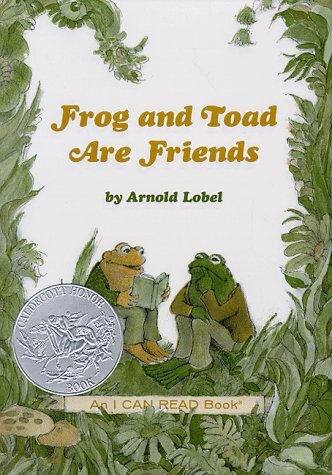
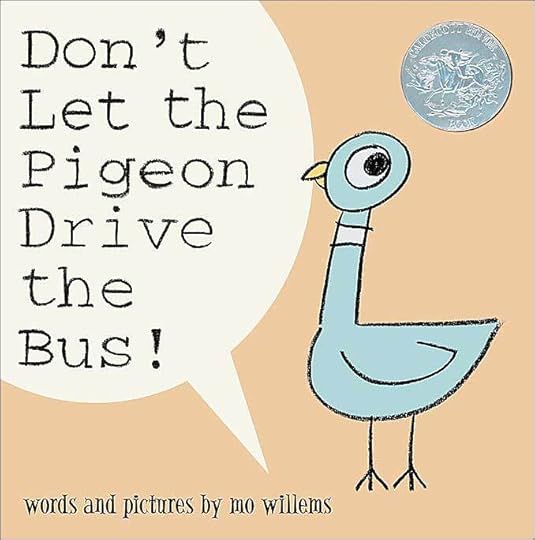
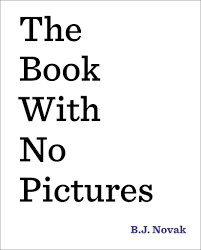
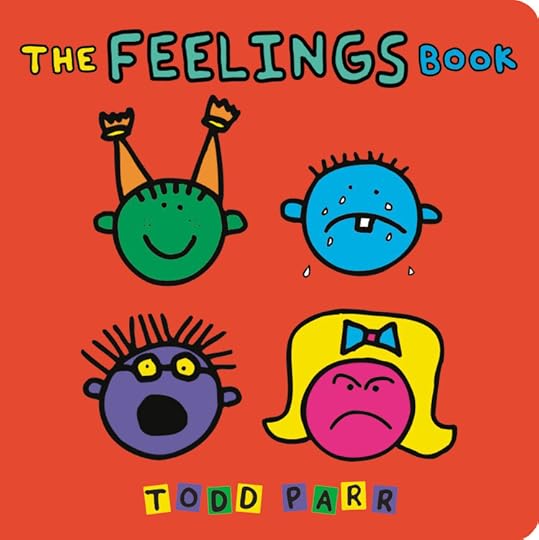

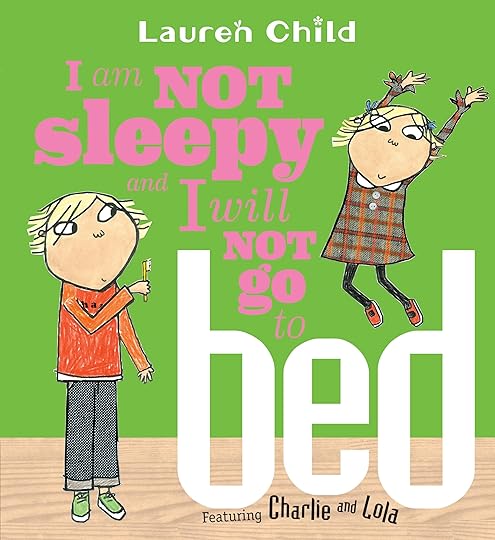 Frog and Toad Are Friends, Arnold LobelDon’t Let the Pigeon Drive the Bus, Mo WillemsThe Book with No Pictures, B. J. NovakThe Feelings Book, Todd Parr (could also be a board book)Hot Dog, Doug SalatiI Am Not Sleepy and I Will Not Go To Bed, Lauren ChildAnd you probably want to switch a few titles or add to them with your favorite toddler book or your children’s’ favorite toddler books.
Frog and Toad Are Friends, Arnold LobelDon’t Let the Pigeon Drive the Bus, Mo WillemsThe Book with No Pictures, B. J. NovakThe Feelings Book, Todd Parr (could also be a board book)Hot Dog, Doug SalatiI Am Not Sleepy and I Will Not Go To Bed, Lauren ChildAnd you probably want to switch a few titles or add to them with your favorite toddler book or your children’s’ favorite toddler books.As time goes by, especially if you are an aunt, you will add to the library, so I won’t get into later titles including chapter books and ones that will more picture books that will reflect their personality and that of the family.

Oh, and if you want to throw a book in the bag for mom to read while she’s nursing, I recommend The Ornithologists Field Guide to Love by India Holton. Obviously the parent will have their own tastes, so proceed with caution, but this is a great, easy-to-read, fun romp of a book and there are more by Holton that can be read afterward.
That’s it. If you have a retirement part or a baby shower coming up (I had both in one day) and you don’t have the mental bandwidth to give it tons of thought, this is my contribution to your mental health. Or at least get the juices flowing.
April 27, 2025
Writer in the Wild: Lev Grossman Event
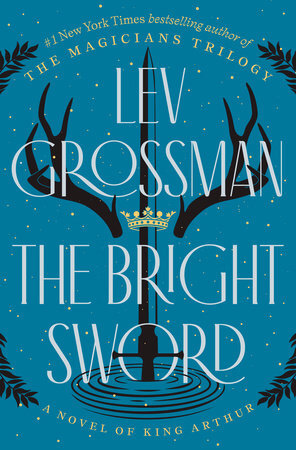
About a million years ago (in July of 2024), I went to a book event with an author that I didn’t yet know. The reason I went is that the novel he was reading from was an Arthurian story and one that I kept seeing everywhere (even though it was just then being published). I love King Arthur stuff. Lev Grossman (don’t judge that I didn’t know him) definitely convinced me to read The Bright Sword and also to go back and read The Magicians Trilogy. I have Bright Sword and The Magicians (The Magicians #1) on my shelves now. I am going to get to Bright Sword really soon. I can see it—I could even grab it if I stretched reeeeeally far—sitting there all alluring on my Read This Soon! Shelf, which, if you can believe it, I have kept to ten titles at this moment. (On the shelf. My head and my internet-based TBRs are a different story.)
Some of the best quotes from the event:
“Growing out a pixie cut is not a thing for public consumption” (said by the hosting author).“Writers are beloved by strangers but loathed by their families” (possibly a paraphrase from another author).Many stories are family stories or found family stories.You can publish a book before you are fully formed as a writer.“It’s humbling to be shown where your imaginative empathy has fallen short.”The Bright Sword is an Arthurian tale, but it picks up the story after the death of Arthur (not a spoiler; one of the most famous books around is literally titled Le Morte d’Arthur). It takes place in modern times but is still Arthurian and it features some of the lesser-known characters from the original stories. Grossman said that T. H. White found a blank spot in the Arthurian legends to write about, and he believes he has done it too.
The Magicians Trilogy is:
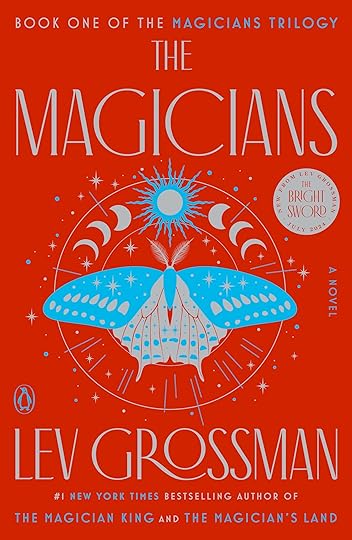
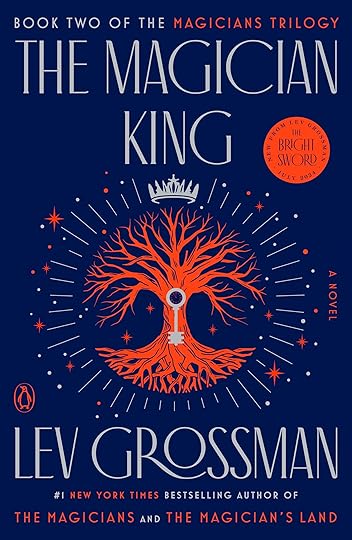
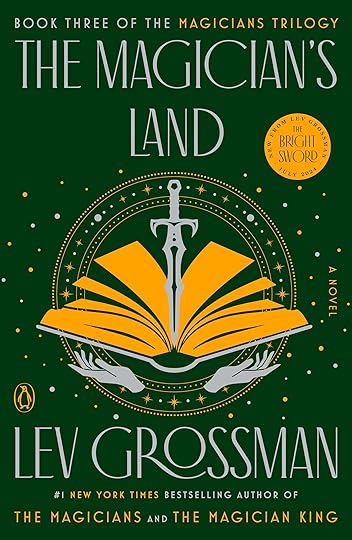 The MagiciansThe Magician KingThe Magician’s Land
The MagiciansThe Magician KingThe Magician’s LandIt is inspired by The Chronicles of Narnia even though people more often compare it to the Harry Potter series. I saw multiple people at the event who had The Magicians tattoos. I had no idea.
That’s really all I have to say. I enjoyed the event. Grossman was engrossing (get it?). I was ready to read his book the second I had it in my hands but sometimes that’s not the way it works. And I am guessing I will love The Magicians Trilogy once I get to it.
April 21, 2025
Book Release Review: Great Big Beautiful Life

Now that all ya’ll are recovering from your midnight Emily Henry parties, I have a review for you. Just kidding. If you were at a midnight release party, you own the book and probably don’t want my two cents. Go read the book and enjoy. As for those of you who don’t know what I am talking about, Emily Henry is at the top of her game, at the very tippy top of the romance book lists every single spring for the past six years, the top of so many readers’ summer reading lists. I have enjoyed reading her paperback titles for the past few summers, and I was pretty excited to get to read an ARC in the days just before the release of Great Big Beautiful Life–it’s my first highly anticipated ARC. I finished this morning (within 24 hours of starting). It drops tomorrow.
It’s possible that Alice is about to land the writing assignment of a lifetime. She is in Georgia to meet with the disappeared tragic heiress that inspired her late father and that the world hasn’t heard from in thirty years. But even though the lead is legit, Alice is shocked to be thrown into a competition for the work, especially when her competition is a surly, Pulitzer-winning journalist. Can a scrappy optimist even compare to his credentials? And by the end, will she even want to?
I guess I should also say (because you are unlikely to be coming from reading my other Henry reviews) that I am not exactly Henry’s number one fan. Nor am I even a big romance reader. But I like to read adequately-written and absorbing romance now and again for a little r&r, and I consider Henry to be the best author I have found for that purpose, so far. (Actually, I found another one just last week, but I haven’t had the chance to review that yet, so we’ll pretend for just a little but longer.) Just so’s you know. I’m more of a literary and speculative reader but I also read, well, everything.
Overall: Great Big Beautiful Life is what I expected. It’s modern romance. And it has some deeper story elements that might be classified as women’s literature. Because that’s what Emily Henry writes. It might be a little longer that her previous books. Is it? Maybe not. Maybe they’re all a little longer than most romance novels (around 400 pages, though those are roomy pages).
Also this: Great Big Beautiful Life is my favorite of Henry’s books so far. Now, there is a caveat—I still have not read Funny Story. I have it here on my shelf. I will read it this summer. Still, out of the five I have read, I like this one the best, hands down.
Despite…
…that spice-seekers are going to get quite annoyed at the two-story interweaving of this plot and the second story stepping in and taking whole chapters at a time. We don’t stay on Hayden and Alice‘s story the whole time. The two stories are related, for sure, but since the main characters are journalists, we are also breaking away to hear the story they are pursuing. And that is sure to annoy a few people who are here for the–as Booktok likes to call it–“smut.”
…that Henry failed a few times on rooting her physical descriptions or reinforcing them, so that when I got to the almost-last page and a character suddenly had short hair or was like thirty years younger than another character (and I had been picturing both not that way), I was quite annoyed.
…that I don’t think Henry’s strength is setting. Her strengths include characters you want to hang with, intricate entanglements, steamy heat, pervasive coziness, gentleness even, and life reflection. But I LOVE Savannah and I recognize that this book just didn’t sink into these spaces, didn’t really paint them large or dwell on them because it’s not the vibes of her books, at all.
…that I saw it all coming. There are some amazing twists in Beautiful Life, but I really did know everything well ahead of time. Hopefully you won’t, because that’ll make for a better read for you.
…that it bounces in and out of first person POV.
…and that the book definitely contains some unrealistic and obvi things, but that’s because of its genre. I don’t need it to be too complicated or nuanced. I read other books for that.
I found myself really happy that Henry stuck with a one-perspective romance at this point in time. I am tiring quickly of two-perspective romances and multi-POV books. That’s not to say I don’t like some of them, I just don’t want every book to be that. It’s overdone and sometimes the simplest is the best.
I thought Beautiful Life had great chemistry (and heat) as well as a touching and real other-story. Both together. Already I see reviews that say the chemistry didn’t work but I just balk as those ones. Cold fishes. It really worked for me.
I continue to be flabbergasted by how Henry comes up with new ideas every time she writes for how to stretch out the steam, moving consummation as close to the end as she can get it. This book has another new reason, even if it’s not completely believable, to accomplish this YET AGAIN. It’s kinda amazing how she manages to do that in a modern world where most people have run out of excuses for it (unless you make them religious, and that’s not Henry’s game). I mean, other romance writers do this too, but I don’t read a ton of them, and some authors don’t bother to try. (They have to deal with ramping it up—raising the physical or emotional stakes—or whatever.) It’s an art, Henry, and I see it.
Also, I was happy to see characters with some age on them. The protagonist and the love interest are already in their thirties (wow!), and most of the other supporting characters are much older.
Conclusion? I was titillated. I kept turning the pages and stayed up late reading. I laughed a little. I shed a tear, twice. So, all goals met, right? At least for this type of book, yes.
Quite frankly, I think readers of Henry and the genre will love this book (even if you’re always going to pass some readers like ships in the night). I enjoyed it. Most of you will too. Take a chill pill and enjoy.
April 12, 2025
Book Review: Lovebirds
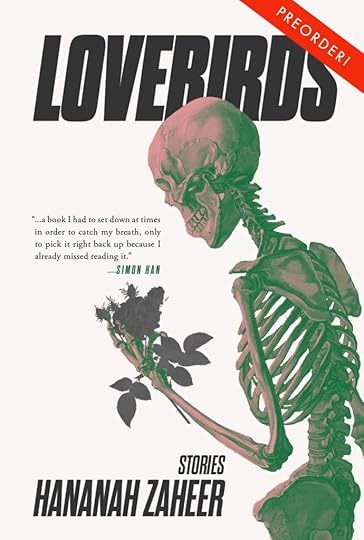 I couldn’t find any cover files without the Preorder! sticker. Sorry.
I couldn’t find any cover files without the Preorder! sticker. Sorry.It’s poetry month! And as a result, I will be reading some poetry. Funnily enough, the first book of poetry I read was not poetry at all. It was flash fiction. It is such a slim volume, and I bought it at the same time as these other books of poetry on my shelf (about a year ago), that when I pulled it for April, I assumed it was poetry. Well, I was wrong.
Lovebirds by Hananah Zaheer is a book of flash fiction (read: very short prose fiction). Which makes sense, because Zaheer taught my flash class at the NC Writers’ Network conference last year. She impressed me (and gained my loyalty) and I snagged her book from the merch table. This book surprised me. The writing is on point, some of the (very short) stories a paragon example of flash. But it was way heavier than I imagined it would be. The book is full of figurative lovebirds, but the kind of lovebirds you would find perched in a cage in a Tim Burton movie. Or in a Neil Gaiman scape. Or worse. All these lovebirds are broken, are all keeping ominous secrets. Are bedraggled, abandoned, skeletal, flightless.
So be ready for that.
My favorite stories were:
God in the Chicken CoopA Record of Her MonthsThings I Say to My Son While He SleepsWillow Tree FeverWednesdayI kept writing in the margin, “So brutal!” “Beautiful, but so sad,” “Dang,” even “Aaah!” Some of the stories were just meticulous, sparse, and perfect. They had been previously published in lit mags including Smokelong Quarterly and Waxwing.
Would I tell you to run out and find a copy of Zaheer’s 48-page book? If you have an interest in flash fiction or just love great modern writing, but only if you aren’t going to flip out at how incredibly sad some of the scenarios are. (Largely women being brutalized by men, but also things like abject poverty and terrorist radicalization). Also, some of the women here are frightening, too, are willing to mete out violence with the best of them. With settings in both Pakistan and America, you might marvel at the language and the structure, but you’ll also gasp at the harshest of realities.
Her writing is powerful. It’s beautiful. And it does not shy away.
April 11, 2025
Read Me: Excerpt from Lucky Jim
I kinda forgot that my “Read Me” category existed on the blog. Last year, I read Lucky Jim by Kinglsey Adams for a book club. I liked the book but acknowledged that it wasn’t aging particularly well because it is a satire, meant for a time and place. However, some of the writing—especially the physical humor—is exemplary. Definitely the hangover scene is the best and funniest hangover scene I have ever read.

“Dixon was alive again. Consciousness was upon him before he could get out of the way; not for him the slow, gracious wandering from the halls of sleep, but a summary, forcible ejection. He lay sprawled, too wicked to move, spewed up like a broken spider-crab on the tarry shingle of the morning. The light did him harm, but not as much as looking at things did; he resolved, having done it once, never to move his eyeballs again. A dusty thudding in his head made the scene before him beat like a pulse. His mouth had been used as a latrine by some small creature of the night, and then as its mausoleum. During the night, too, he’d somehow been on a cross-country run and then been expertly beaten up by the secret police. He felt bad.”
Lucky Jim, Kingsley Amis, opening paragraph of ch.6, p60.
April 10, 2025
Book Review: Beasts of Prey
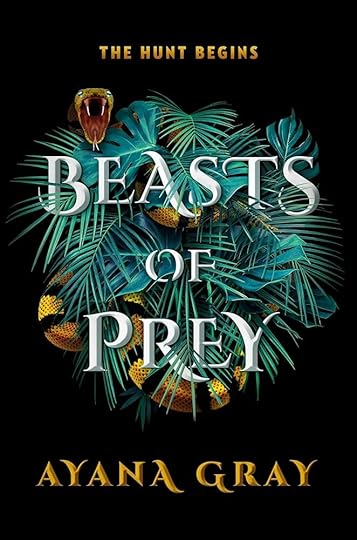
I was looking at the line of April TBR book spines on my shelf last night, thinking about how good they all looked and wondering how many of them will disappoint me. I’ll say it yet again: I wanted to like Beasts of Prey (Beasts of Prey #1) by Ayana Gray. For a little while there, I thought I was going to. But this book starts off so much better than where it goes and where it ends, and I am not on board with this book. We need more African fantasy, yup. But this is not it.
Koffi is an indentured beastkeeper, stuck indefinitely with her mother in the Night Zoo. But when the ringmaster makes Koffi really mad, things happen that she can’t control and doesn’t understand, leaving Koffi on her own and the Zoo a pile of ash. Meanwhile, Ekon is about to follow his ancestors into the role of a Son of the Six, but he pauses in his mission and throws his future into uncertainty. Koffi and Ekon both need to hunt down the murderous Shetani in the Greater Jungle in order to turn their destinies back around. What would happen if they worked together?
When I started reading Beasts of Prey, the African fantasy world-building was so interesting, so intriguing. I really wanted to like it; heck, I was madder and madder the further I read because the first few chapters were of a caliber that was acceptable, but then deteriorated rapidly. I saw some good in it, and then it was a slow train wreck. I think my first indication that something was off was the slave-master dynamic a couple chapters into Koffi’s perspective. (This is a three POV book.) It was really off, and not consistent with either the slave’s (indentured servant, technically) or master’s characters as they were given thus far. Then the beginning dragged on. Then the downward spiral picked up speed.
(If you read this book and liked it, maybe skip to the end. My panning of it will probably just anger you.)
There is one writing misstep I can never forgive, and that is bad writing. Adequate writing I can work with, especially in genre fiction and especially if I am given good characters, a great story, or some other addictive quality. Below-average writing I can excuse in some cases. (See Twilight.) Consistently bad writing? That’s a big fat no for me. I’m going to let the text speak for itself for a minute.
“He thought he could see opaque tendrils of steam rolling off the very trees in wispy sighs, slicking their arms, legs, and foreheads in a sheen of sticky sweat. He licked his cracked lips involuntarily at the same time Koffi’s stomach audibly rumbled” (p293). (He thought he saw steam slicking their bodies with sweat? Or was it? The subject and object are off. And no to pairing the clauses in the next sentence. “Very” should not be there. Neither should “involuntarily.”)“It took Ekon a moment to understand the cause of the unease running down his length, but then he pinpointed it” (p304). (His what? His length? And why go through this whole mental process (which is done like this constantly)?)“Koffi almost thought it looked distinctly curious” (p369). (Too many modifiers. Adverb. Half-butted qualifiers. How about, “It looked curious to Koffi”? Or just “It looked curious.”)“Lkossa’s stars twinkled like diamonds against its obsidian-black night sky. Through her barred window, Koffi could not see them” (p419). (Cliche much? And then you just described something we can’t see in our POV? Heck, no. And why, actually, can’t she see them? Also, obsidian and black are the same thing; one needs to go, and that would be “black.”)What began with grammatical errors and typos led to overuse of adverbs (especially the word “very,” see above), repetitive adjectives, nonsensical spatial things, convenient plot devices, inconsistent characterizations and problematic reactions… And I kept stopping to wonder if Gray has ever been in a jungle. I’m going with no. Because the way the characters move through the jungle has weird physicality to it, lacks any sort of realism or sense of what that would really be like. And I’m sorry, but you can’t use a map in a jungle with zero landmarks and no trail. What were they even looking at to “figure out where they were”?
There are cliches (see above), difficult sentences (often with pronoun confusion), metaphors and similes that sound good but don’t make sense, and inconsistency, full stop. For example, someone would be wounded one second and then they would bound up and run to someone in the next. Or someone would be angry and then they’d smile at someone warmly. Or they wouldn’t know how to do something and then they’d do it. Or they’d tell us it was the most tired they’d even been when we’d just seen them more tired in the scene before. And don’t get me started on the POV shifts. Yes, I do mean the strange back and forth at the beginning when the reader keeps getting dragged back in time and I also mean that Adiah’s perspective is not needed (or at least could have been done better), but I mostly mean the confusing head-hopping. The plot was predictable, average, not always interesting. There were a lot of side-quests and randomness and long scenes of unbelievable introspection. We had to believe what we were being told without being convinced, basically. The romance between kinda flat, stock characters was neither earned nor timed right.
And the ending? Let’s begin here: I totally knew every twist long before it was revealed, like it had slapped me in the face ten, twenty chapters too early. (When I started the last chapter, I predicted the last word of the book. Not even joking.) I take that back, there was one surprise, but I kind of feel like there was no way of knowing that one, which is another type of cheat, actually. I would have to go back to make sure, but as a reader I felt cheated by it. Also, when a cliffhanger involves the bad guy on top, that is not an appropriate ending to a book. That is still the dark night of the soul or the All is Lost moment, which comes before the climax and resolution, even if there is more to the series.
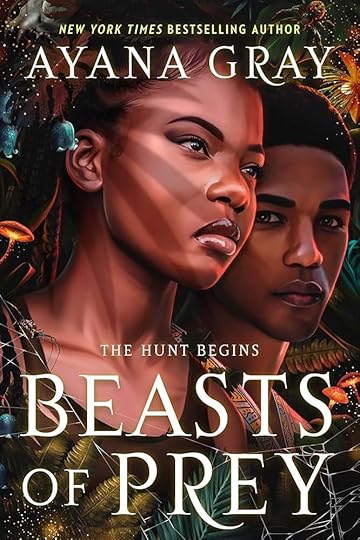 This is the cover on my copy. It lacks the artistry of the original, I think. But maybe it gives you something that the title really doesn’t: a clue.
This is the cover on my copy. It lacks the artistry of the original, I think. But maybe it gives you something that the title really doesn’t: a clue.Before I leave off my complaints, let me ask the obvious: why the new cover, publisher? The people on it are beautiful, but it’s not a great cover, it looks a little cheesy, and people were drawn to the old one. Lots of strange editorial choices all around.
At book club, some people liked the world building, called it solid (though they admitted in the same breath that the structure and characters needed work). There was plenty of mythology, fable, and legend to look up. Everyone also seemed to like Ekon being neurodivergent (though some people thought he was just OCD. I and some others strongly disagreed). People also defended the teen characters regarding their bad decisions, because they’re teens. I found some of the decisions to be forehead-slapping stupid, but I can understand my fellow readers’ point. I think they were trying to be nice to a debut novel.
In conclusion, I would say this book suffered from a publisher seeing potential in an idea and an editor failing to edit this into a serviceable piece of literature. The author? It was on Gray to follow her characters, which it appears she very much did not, which led to a plot plan lacking authenticity.
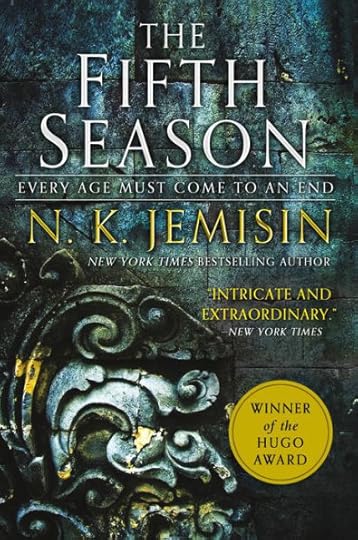

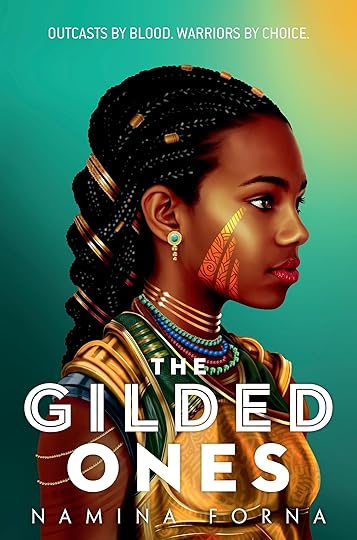
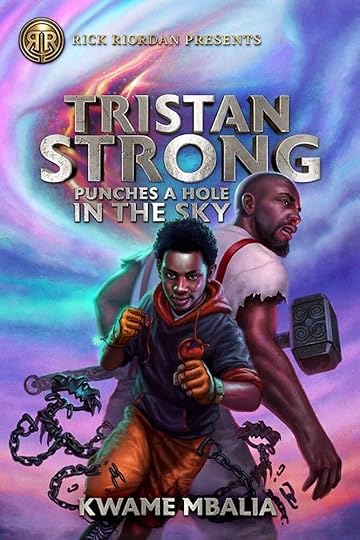
People at book club recommended N. K. Jemisin’s Broken Earth Trilogy, Akata Witch (Nnedi Okorafor), and The Gilded Ones (also a trilogy, Namina Forna) instead. I was also not a huge fan of the Tristan Strong series, but my son was, and it was better than this, though aimed at a younger audience. I will not be continuing the series, which is:
Beasts of PreyBeasts of RuinBeasts of War (final book in 2024)
“She knew that poverty could be a different kind of monster, always lurking and waiting to consume. For some, death was the kinder beast” (p45).
“A wise man keeps his weapons sharp, but his mind sharper” (p116).
“Tao thinks my biggest fear is that I won’t master my power with the splendor, but in truth, that is not what I fear most. / My fear is that I’ll never get used to it” (p153).
“’You do not have to be the largest or the most dangerous fighter, Ekon,’ he said quietly. ‘So long as you are the fastest’” (p187).
“Often, the beasts that lashed out the worst were also the ones hurting the worst” (p261).
“…whatever was buried in Ekon was buried deep. If he wanted to dig it out, he’d have to do that himself” (p261).
“’You must do more than try, Koffi,’ she said quietly. ‘You must succeed’” (p342).



